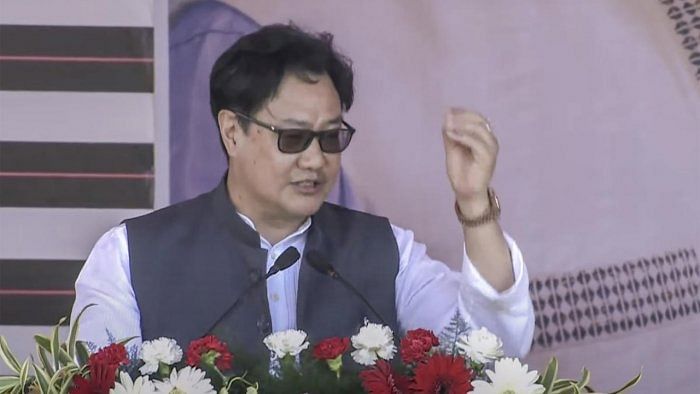
Amid a tussle between the government and judiciary over appointment, Law Minister Kiren Rijiju on Thursday said the government has a "limited role" in appointing judges and it cannot look at names beyond what the Supreme Court collegium sends.
Rijiju's comments came in Rajya Sabha during the Question Hour when MPs, including Congress' Rajiv Shukla and Vivek Tankha, DMK's Tiruchi Siva and BJP's Sushil Modi, raised questions about the pendency of cases and vacation of courts among other issues.
Referring to the pendency of around five crore cases that would have a huge impact on common people, the Law Minister said the government has taken various measures to reduce pendency. But he added, "at present, the government has limited powers to fill the vacancies (in courts). The Centre cannot look for names other than those recommended by the collegium."
He also referred to the Supreme Court striking down the National Judicial Appointments Commission (NJAC) Bill, saying Parliament and people had expressed their will by passing the law.
Somehow, the Minister said he feels that "we are not working as per the spirit of the House and feelings of the people of the country".
Emphasising that the government is giving full support to reduce pendency of cases, Rijiju said, "but questions will keep arising on vacancy of judges and appointments till we create a new system for appointments."
According to official statistics, 777 judges are working in High Courts as on December 9 against the sanctioned strength of 1,108, leaving a vacancy of 331 or around 30%. In the Supreme Court as on December 5, there are seven vacancies -- 27 judges working against the sanctioned strength of 35.
Rijiju said the government has been writing to Chief Justices of the Supreme Court and High Courts to send the names for filling up vacancies. He said the government has conveyed to them to "send names (of judges) that reflect the quality and India's diversity and give proper representation to women".
"I don't want to say much as it may seem like the government is interfering in the judiciary. But the spirit of the Constitution says it is the government's right to appoint judges. It changed after 1993," he said.
In the recent past, Rijiju and the Supreme Court were on a collision course over judicial appointments. Vice President and Rajya Sabha Chairman Jagdeep Dhankar also joined in criticising the Supreme Court.
However, the Supreme Court said, "speeches made by the high constitutional functionaries in public, making comments on the Supreme Court Collegium, are not very well taken. You have to advise them."
